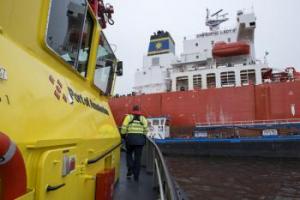Harbour Master
Harbour Masters
Worldwide there are approximately 3,000 merchant ports and the work of the Harbour Master can vary widely from country to country and from port to port even within the same country.

IHMA is run on a day-to-day basis by the Executive Committee which is referred to as ExCo. This consists of 7 Officers (The President, 5 Vice Presidents and the Treasurer) and is supported by the Secretary. The Vice Presidents are required to be Full members of the Association; the Treasurer is required to be a Full member of the Association when first elected. These seven positions are filled by election held at each Ordinary General Meeting (OGM). Once elected by the Full members of the Association, the Vice Presidents elect the President from amongst their number. Other members may be co-opted to ExCo for specific purposes, such as the next Congress Chair and the Chair of the Papers’ Committee.
ExCo meets quarterly and is increasingly doing so using electronic means. However, it always meets ‘face to face’ just before and at the end of each Congress; the latter meeting is held in combination with the IHMA Council.
The Council consists of six full members who are also elected at each OGM and exercise immediate oversight of ExCo. It is accepted practice for the Council to be consulted about the proposed annual budget and any sensitive issue arising at ExCo meetings.
The Constitution of the International Harbour Masters’ Association sets out the articles under which the IHMA shall exist and operate. Amendments to the Constitution are approved at Ordinary General Meetings (OGM).
The Constitution was initially approved by an Ordinary General Meeting of the European Harbour Masters’ Association in Reykjavik, Iceland, on 21 June 1996, with the agreement of those harbour masters from outside Europe in attendance at the Sixth Congress of the EHMA. A substantially revised Constitution was approved on 1 June 2016 at the OGM held in Vancouver during the 10th IHMA Congress.
IHMA members within a defined geographical region of two or more neighbouring countries may seek IHMA authority to establish a Regional Committee. The aim of a Regional Committee is to further the specific interests of IHMA's members within that region.
At present, there are two Regional Committees, the European Harbour Masters' Committee (EHMC) and the African Harbour Masters' Committee (AHMC).
These Regional Committees are managed by their respective boards from which a Chair is elected to each. There are board members representing each of the specific areas of the region - South, East, West, North and Central. The Chair of each Regional Committee is co-opted to ExCo.
International Maritime Organization (IMO)
The International Maritime Organization (IMO) is the United Nations specialised agency with responsibility for the safety and security of shipping and the prevention of marine pollution by ships. Find out more about the IMO here.
IHMA has Non–Governmental Organisation (NGO) consultative status at IMO. The purpose of consultative status is to enable IMO to obtain information or expert advice from NGOs with specialist knowledge in a particular area of maritime activity and to enable such NGOs, representing their members whose activities have an important and direct bearing on IMO’s work, to express their points of view.
Members of IHMA may attend IMO meetings by arrangement with the IHMA Secretary. Members of IHMA are able to participate in Correspondence Groups between meetings and in Working Groups during IMO meetings.
International Hydrographic Organization
The principal aim of IHO is to ensure that all the world's seas, oceans and navigable waters are surveyed and charted. Its vision is to create a global environment in which States provide adequate and timely hydrographic data, products and services and ensure their widest possible use. IHMA has Observer status at IHO and contributes to work streams associated with the provision of nautical port information.
Whilst maintaining relations with many maritime organisations, especially those represented at IMO, IHMA has signed Memoranda of Understanding (MoU) with four organisations.
IHMA is represented at meetings of IALA. IHMA members have the opportunity to participate in PIANC Working Groups which develop guidance to inform the construction and management of waterborne transport infrastructure.
National Associations for Harbour Masters are active in some countries.
Steve Rushbrook never predicted he would become a Harbour Master, let alone in one of the southernmost ports in the world. His career pathway to becoming a Harbour Master for New Zealand’s Otago Regional Council shows what is possible for those with less conventional backgrounds.
As part of the refurbishment for the operations and maintenance (O&M) base for the Rampion Offshore Wind Farm, Inland and Coastal Marina Systems (ICMS) has installed a floating concrete breakwater within the Port of Newhaven to provide safe berthing facilities for crew transfer vessels (CTVs).